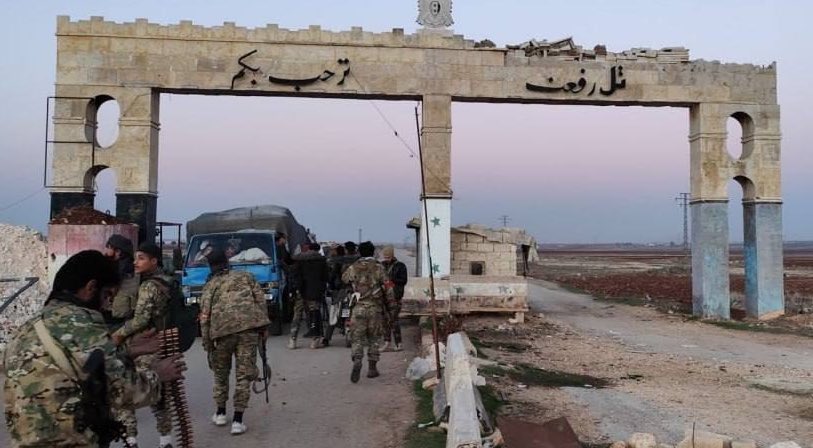Syrian opposition forces backed by Turkey have launched an offensive targeting Tal Rifaat, the last Kurdish-controlled enclave in Syria’s northern Aleppo province, and have entered the city center, as Islamist militants of Hayat Tahrir al-Sham (HTS) and allied factions expand their control south of Idlib following a dramatic seizure of Aleppo city, Turkey’s state-run Anadolu news agency reported on Sunday.
#BREAKING Syrian National Army enters center of Tel Rifat in Operation Dawn of Freedom launched against PKK/YPG's terror corridor plan along Tel Rifat-Manbij line pic.twitter.com/iSu9eGRyfI
— Anadolu English (@anadoluagency) December 1, 2024
The offensive is part of operation “Dawn of Freedom,” led by the Syrian National Army (SNA), a Turkish-supported coalition of opposition groups, and is aiming to wrest Tal Rifaat from the Kurdish-led Syrian Democratic Forces (SDF) and remaining elements of the regime of President Bashar al-Assad. As part of Dawn of Freedom, SNA units also advanced from al-Bab and captured Kuweires Military Airport in eastern Aleppo. The operation secured key regime facilities, including Brigade 111, the Air College and officer housing. SNA forces seized six tanks, a howitzer cannon and an air defense vehicle. The offensive cut the Aleppo-Raqqa highway, disrupting regime supply lines and forcing their retreat.
This operation is part of a broader escalation in northern Syria, where HTS and opposition fighters recently captured Aleppo in a surprise advance that disrupted years of frozen conflict lines.
On Friday night HTS, an alliance of rebel fighters led by al-Qaeda’s former Syria branch, declared full control of Aleppo city after a swift campaign that overwhelmed regime forces. The group’s offensive began in the western countryside of Aleppo and Idlib, gaining momentum as opposition fighters took over 80 villages and towns within days, including critical infrastructure such as Aleppo International Airport and the M5 highway, a key route linking Damascus to northern Syria.
Simultaneously, HTS-led factions have pushed southward into regime-held areas of Idlib and Hama provinces. Strategic towns such as Saraqeb on the M5 highway and Ma’aret al-Nouman have fallen, isolating regime forces and cutting off supply lines. Observers say the rapid advances have revealed the weakness of Assad’s forces, already stretched thin by reliance on Russian air support and Iranian-backed militias, many of which have been redeployed to other regions.
The SNA’s focus on Tal Rifaat is part of Turkey’s broader strategy to establish a buffer zone along its southern border. Ankara has long considered the SDF, led by Kurdish forces, as an extension of the Kurdistan Workers’ Party (PKK), a group it has designated as a terrorist organization. Turkey’s military involvement in Syria, including multiple cross-border operations, has aimed to curb Kurdish influence while supporting opposition forces.
The SDF, a key US ally in the fight against the Islamic State in Iraq and the Levant (ISIL), has declared a general mobilization in response to the assault on Tal Rifaat, warning of an impending humanitarian crisis as clashes intensify. Kurdish officials have accused Turkey and its proxies of attempting to forcibly displace Kurdish populations, a claim echoed by human rights organizations monitoring the conflict.
Airstrikes bringing devastation and claim lives in #Idlib city as Syrian regime warplanes continue to target residential neighborhoods today. Our teams are working to assist the wounded and rescue civilians trapped under the rubble.
Several civilians have been killed and injured… pic.twitter.com/8G7UOV8Nmi— The White Helmets (@SyriaCivilDef) December 1, 2024
Meanwhile, the Assad regime has launched retaliatory airstrikes on opposition-held territories, including in Idlib and Aleppo, targeting civilian areas and critical infrastructure. Rescue workers reported numerous casualties from the bombings, heightening fears of a broader humanitarian disaster.
The dramatic advances by opposition forces, particularly HTS, mark a turning point in the Syrian conflict, which had seen relative stability since 2020 under international ceasefire agreements. Analysts suggest the collapse of regime defenses in Aleppo and Idlib signals a weakening of Assad’s grip on northern Syria, exacerbated by the diversion of Russian and Iranian resources to other geopolitical conflicts, including the war in Ukraine.
This resurgence of violence comes against the backdrop of Syria’s ongoing instability, with millions displaced and reliant on humanitarian aid. The international community has been slow to respond, leaving the region vulnerable to prolonged conflict and escalating human suffering. As opposition forces consolidate their gains, the coming weeks may determine whether Syria’s long-dormant conflict lines reignite into a broader war.

